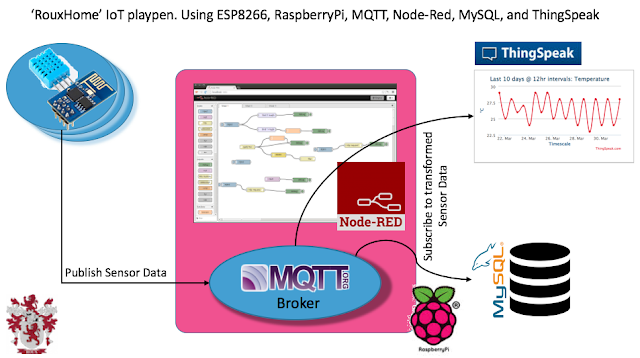Hello Chaps,
I'm new here and am just trying to work ESP8266 ESPEasy sensors into my system, but I thought I'd give you a run-down of what I'm using so we can compare notes.
At the core of everything I have a Raspberry Pi running Node-Red. It has flows implementing well-defined REST APIs for:
1. Controllers (remotes, switches, pushbuttons etc)
2. Lights (lamps switched by RF sockets)
3. a few other things like TV/media-PC combinations
I have mongodb (document database) and mosquitto (MQTT) running on a separate Raspberry Pi.
* MongoDB for config and persistent state storage
* Mosquitto for device-to-device comms
A single pair of superheterodyne 433MHz RF receiver and transmitter modules receives and transmits control codes to switch sockets on and off. Node-Red maintains state for each device in the MongoDB database so there's never any confusion about what's on or off.
Node-Red also tracks daylight/night-time, presence of known individuals, and a few other things.
I have some Philips Hue lights, and a Philips Hue Bridge 2.0.
I also have Homebridge running on the node-red Raspberry Pi, which brings everything the Node-Red pi controls into the Apple Homekit config. Remote access is provided by a second hand Apple TV 3 sitting in a cupboard, disconnected from any TVs.
Now for the ESPEasy bit... I want ESPEasy sensors gathering data (PIR, temp/humidity, lux, rain etc) and publishing it to MQTT. At the moment (R78), with the only MQTT support being the ridiculous ego-centric disorganisation of Domoticz (which shows they really don't get the MQTT concept at all), or the over-simplified OpenHAB format, it's all a bit annoying. Node-Red has to gather loads of little bits of stateless data from each sensor, tracking each data point and performing analysis in order to analyse trends and raise events.
Yes. Events. I really don't care that much about the raw data. It's of no consequence to me. I want the bad news. Dumb gathering of stateless data points just requires a lot of work to be done to make the data useful.
Before I discovered ESPEasy, I was gathering much more useful data - performing a certain degree of analysis, and tracking state on the ESP8266 device itself, so by the time it was published on MQTT, in JSON packets, it contained things like the current date/time, the delta since the last data point, the time since the last data point (in the case of data sent only when it changes), moving averages, min & max figures, current rate of change, and so on. Hopefully you can see why this might be useful. It's all about events. It's so much easier to spot that your freezer is defrosting when you can see a positive rate of change, and a one-degree delta since the last reading which was only a few minutes ago - no additional processing or data logging/tracking required.
So it's been a bit of a downgrade coming to ESPEasy. So why am I using it? Because...
1. It takes care of all the config stuff for me
2. It gives me a generic, configurable platform for my sensors
3. I hope I can help improve it
I have no use for Domoticz or the other platforms I've tried. They put far too much emphasis on dashboarding and not enough on providing me with useful events from which to hang useful actions.
All IMHO of course. But then, when has controlling everything been a humble thing?!

Jon
